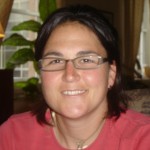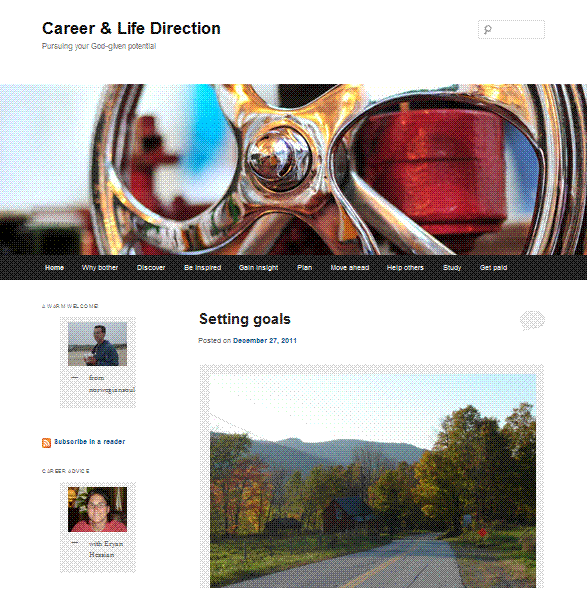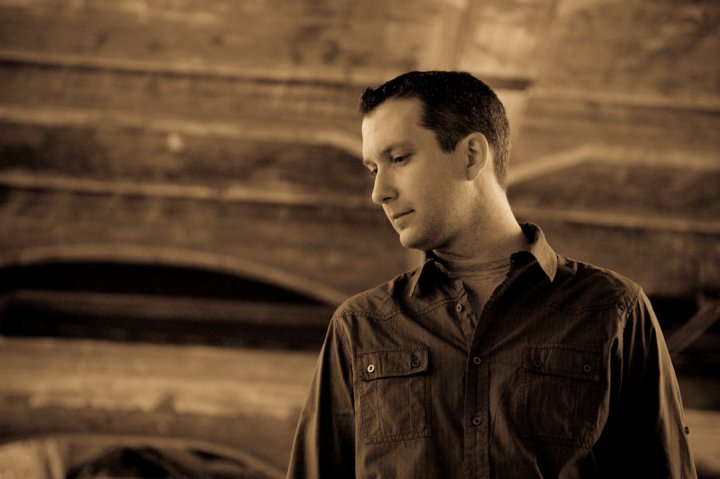Courage and calling
- At January 20, 2015
- By Nathan
- In Career Planning
 0
0
Courage & Calling: Embracing your God-given potential could have been designed with this website in mind. But of course it wasn’t. The author, Gordon T. Smith, wrote the first edition back in 1999 during a sabbatical in the midst of a personal transition. The edition I picked up had been revised in 2011, about the time this online resource began to take shape.
Search and you will find that all sorts of people have been reflecting and talking and writing about these issues for a long period of time. And this, I suspect, will never change. Or at least not any time soon. And each person brings something unique to the discussion.
Gordon grew up in Ecuador and worked in the Philippines before arriving in Canada, and most recently Calgary, where he now serves as the president of Ambrose University. He is ordained with the Christian & Missionary Alliance in Canada, has a Ph.D. from Ateneo de Manila University, and has been working as an academic and administrator in theological colleges for most of his life.
But fear not, this isn’t a dry or dull academic document. It is written, rather, in a straightforward and accessible style and is quite easy to read. As an aside, I found that focusing on this book was more refreshing and enjoyable – and likely beneficial – than staring at a computer screen for the same period of time.
What is this book essentially about? And who will benefit from taking the time to read it?
As the title suggests, the focus is on the courage that each of us will require in order to live out our unique vocation or calling. Courage & Calling is roughly divided in half. The first half is dedicated to a theological vision (for lack of a better phrase) for work and practical insight about the career selection process. The next half begins with a closer look at four specific types of work: business, the arts, education, and religious leadership. What follows is a discussions surrounding five “points of leverage” or rather ways in which we can each increase our effectiveness. This includes: developing courage, continuous learning, emotional resilience, working well with others, and establishing structure and order in our lives.
Of all the points of leverage discussed, Gordon feels that developing emotional resilience is likely the most important one. With this in mind, on page 221, you will read this: “Lack of emotional maturity and resilience will sabotage our lives and vocations.” Strong words perhaps, but nonetheless words that need to be taken to heart.
Unlike other books I have read, and briefly reviewed, this one has a strong emphasis on the organizational side of life. In other words, you will find practical advice here specifically in terms of how to be more effective within a particular organization. At the same time, Gordon emphasizes the importance of carefully selecting where you work. This may sound like a luxury to some. But it makes sense to find a place to work that is a fit with who you are as a person if at all possible. There is also practical advice here related to deciding when it might be a good idea to resign and move on.
One more point to ponder related to content.
Throughout his book, Gordon addresses a number of misunderstandings related to the career selection progress, particularly within the various Christian communities he has been a part of. For example, he feels that personal desire has been misunderstood and often regrettably downplayed. At the same time, he thinks that there has been too much emphasis on meeting immediate needs and not enough instruction on how to determine which needs to meet. For a sense of personal vision and direction is required in order to live a more effective life.
Trying to figure out what do to next? Longing for more of a sense of person direction and focus in your life? Interested in discovering what a “theological vision” for your career might look like? Hoping to move beyond a merely secular take on life? Well then, reading this book would likely be well worth your time.
*Another version of this review is available at Converge Magazine. And here is a brief video by Gordon T. Smith about vocational discernment.
© Career & Life Direction 2015. All rights reserved.
Leah’s journey so far
- At October 12, 2013
- By Nathan
- In Career & Life Planning
 0
0
Today Leah Kostamo, co-founder of A Rocha in Canada, shares lessons from her life journey
When I was twenty-one years old I heard God’s call. I was sitting on the grass outside the University of Arizona library, when I heard (with the ears of my heart, yet no less clearly than if it had been the ears of my ears!), “Go ye on staff with Campus Crusade for Christ.” And my heart sank right into my toes. This is not what I wanted to do. Firstly, because I wanted to go feed starving people in Africa. Secondly, because I wasn’t the “crusading” type.
But after three pretty miraculous confirmations, I packed my bags and headed off to the University of Idaho to fulfill Christ’s Great Commission of making disciples of all nations. Cue the big bass drum…Dum, dum, dum!
Look for that intersection between your greatest gifts and the world’s greatest needs
And I felt like I had come home. If I could have, I would have pulled up an armchair at the hearth of that school and stayed forever. But graduate school is a fast moving train and in what seemed like a nanosecond I had disembarked and was standing at another crossroads.
This time around I barely had time to pray, let alone fast. Within the span of a week, a sure-fire job fell through, a roommate made an offhand comment about a wonderful school overseas, I called the administrators of said school who said they were looking for someone with my exact qualifications, and three people independently offered to fund my posting. Et, voila! A few weeks later I was on a plane to teach at a college on the shores of the Baltic Ocean.
And again I felt like I had come home.
So, to recap:
- Existential call of God, which I heed as an act of obedience – feels good.
- Silence of God, so I follow my heart – feels like home.
- Circumstances and miraculous provision dictate call – again, home.
But the big daddy of vocational callings was still on the horizon. At thirty-two I got married and moved back to Canada where my husband Markku and I held our vocational future up to the heavens for guidance and blessing. We stood in this posture for nearly two years (long enough for our arms to get good and tired!).
By the end of that time it was clear that money was not to be a deciding factor in whatever we did. And barring a miraculous call, we would follow Frederick Buechner’s advice and look for that intersection between our greatest gifts and the world’s greatest needs.
Enter A Rocha. Weird name, I know. It means “the rock” in Portuguese and began as a Christian environmental centre on the coast of Portugal nearly 20 years previous. Imagine the Sierra Club, meets a youth hostel, ground the whole idea in Christian community, and you have a flavour of the thing.
A Rocha’s ministry of extending God’s love to all of creation was like the knitting of all the strands of our lives together. From our training in ecology and entrepreneurial leadership (Markku) and campus ministry and education (Leah) to our love for other cultures and community, the work of A Rocha was like a pair of old jeans we stepped into and found that they fit perfectly.
Even so, birthing A Rocha in Canada felt like the labour it was. There were salaries to raise, an environmental centre to acquire, staff to be found, meals to be cooked, and on and on. We shed many a tear of frustration. But more often, our eyes filled with tears of gratitude, especially as we watched the humble, but deeply good work of earthkeeping unfolding all around us; whether that looked like restoring a salmon stream or opening the eyes of a child to the beauty of creation or sitting with a struggling intern.
We watched, astounded, as the tiny seed of an idea grew into a glorious tree in which the birds of the air had come to roost (literally!).
So, to recap once again:
- No rulebook for how God calls — sometimes via a megaphone, sometimes a whisper, sometimes the call just looks like our lives.
- No rulebook for how to confirm God’s vocational calling — it always feels like home, but sometimes that home needs to be built from the ground up with blood, sweat and tears.
So, if there’s no rulebook, what is there?
Well, there’s God’s overarching call – a call to every human being on planet earth to act justly, to love mercy, and to walk humbly with God (Micah 6:8). There’s obviously lots of room for vocational creativity within that calling. Farming, parenting, painting, pastoring, frog and fungi studying — wherever and however we care for people and places with our unique gifts and skills and with an eye toward justice and love, we are sitting in the centre of our calling.
If God blasts you with a megaphone, great. If not, take a step back and take in the wonderful vocational tapestry God has been weaving with the strands of your life already. It will look like what you’re good at and what the world needs.
 Leah Kostamo is the author of Planted: A Story of Creation, Calling and Community. She likes to read (and write) wise and winsome stories that inspire people to be the change they want to see in the world. She can be found online at leahkostamo.com. She ministers with A Rocha, a Christian conservation organization.
Leah Kostamo is the author of Planted: A Story of Creation, Calling and Community. She likes to read (and write) wise and winsome stories that inspire people to be the change they want to see in the world. She can be found online at leahkostamo.com. She ministers with A Rocha, a Christian conservation organization.
Telling your story
- At January 11, 2013
- By Nathan
- In Career & Life Planning
 0
0
Since this website has a global focus, it really doesn’t matter where you live. Articles travel fast via email. If, however, you hail from Saskatchewan or light up when you hear the words “Trailview” or “Greenridge” consider this to be a personal invitation.
But be aware that Career & Life Direction is not presently listed among the Fortune 500 group of companies. Which is to say, that I am offering a modest amount of media fame and $50 per article.
At the moment it would be great to be able to offer other perspectives in the following three areas:
1. Career Selection
What do you do for a living? Or, if you are now retired, what did you do? And what advice would you offer to a young person who is seriously considering the same career? What do they need to know in order to make a wise decision? The idea here is to provide personal and practical advice.
So far, I already have an article from a pastor and a nurse? Are you a doctor, a teacher, a farmer, an accountant, a carpenter, a banker, etc.? Why did you choose this career or vocation? Imagine that you are talking to a young adult who is just starting out in life. What could you say that would help them discern if this career is a fit for them?
What do you find exciting and fulfilling about what you do? And what do you sometimes find difficult? Careful consideration is required when making a career decision.
2. Personal Direction
Do you have a personal mission statement which serves to guide the overall direction of your life? If so, how did you go about putting it together? What does it say? And how has having this helped you make decisions over the years? Give specific examples.
The goal is to assist people who are frustrated because of a lack of general direction in their lives. What could you say to encourage and direct someone in such a situation – regardless of their age? What specific steps could they take to go about acquiring a more clear sense of direction?
In my own case, two books were particularly helpful. More information about these books is available in the “Progress” section. But the process may have been quite a bit different for you.
Any thoughts?
3. Organizational Development
Finally, do you have a leadership role in a small or large organization? Have you served on a governing board? Are you the president or the CEO of something? Are you actively leading a business, a church, a government department, or a community organization?
Is your name Stephen Harper? Yes, it is okay to write about running a country. Although I’ll understanding if you are too busy dealing with protests and a variety of other problems.
How have you helped to shape the direction of the organization you are a part of in a positive way? Do you feel that what you are a part of has reached or is beginning to reach its full potential? Why or why not?
More to the point, what advice would you offer to a leader who is struggling to clarify a vision or develop the potential of a group of people? What has worked for you? Is there a resource you have found helpful and would want to recommend?
Well, that’s about it for now. Thanks for your interest!
Nathan
*Please be aware that your article will be edited. In the process, I will attempt to preserve your voice and clearly convey what you are trying to say. Click on “Contact information” at the bottom of this page in order to ask a question or submit an article for consideration.
The gift of guidance
- At October 31, 2012
- By Nathan
- In Career & Life Planning
 0
0
How could you help someone you know and love acquire a more clear sense of direction? Have you ever thought about that?
Are you looking for a way to help your son or daughter, your grandson or granddaughter, get off to a good start? Or, are you trying to simply support and encourage a friend during a time of vocational transition? Perhaps you also want to communicate that you care and want to be involved in their life.
Helping someone you love clarify their career and life direction could make a big difference. Your initiative now may benefit them in many ways down the road. But it isn’t always easy to know how go about it. And the whole process can become awkward. Soon the relationship feels strained.
Guidance that is appropriate for one person may not be as fitting for another
It is a good rule of thumb to always ask before offering? Get their input. Find out what type of assistance or involvement they would appreciate at this time. As children develop into adults, it is a good idea to increasingly do more and more asking and less and less telling. Look for a form a guidance you feel might be beneficial to them, and then ask if they are interested. Always ask.
Asking implies accepting the answer.
Even better, get to know your friend or relative. Spend time with them. And listen carefully to that they say. Encourage them to identify what they need and to communicate freely. It works best if they can take the initiative and ask you for your input or involvement. This way, they won’t feel like you are barging into their life and offering them advice they didn’t ask for and don’t need.
Acquiring a sense of direction can take time. And guidance that is appropriate for one person may not be as fitting for another. Some people need time to wander in the career and life direction wilderness for a while in order to figure things out on their own. But others likely would have benefited if more encouragement and support had been provided early on.
You will need wisdom to know when to step back and wait, and when to step up and offer to help.
Just so you know, it is possible to purchase the career planning and consulting services offered here at Career & Life Direction on behalf of another person. And here is one way of going about it:
1. Tell your friend or family member about these services.
2. Communicate what you would be happy to purchase for them – if they are interested.
3. If they are interested in exploring this online service, ask for their email address.
4. Go to the “Contact Information” page. Enter your name and email address. Communicate briefly what you would like to purchase on behalf of another person. Please include their name and email address in your note. Click “Send” at the bottom of the page.
5. Finally, go to the “Career planning and consulting” page and make your purchase.
6. Your friend or family member will then be registered in the TypeFocus program and soon receive an email telling them how to get started.
I hope that this service will help you help others.
© Career & Life Direction 2012. All rights reserved.
Finding what you are looking for
- At August 09, 2012
- By Nathan
- In Career & Life Planning
 0
0
One advantage of the Internet is that an incredible amount of information is instantly available. One disadvantage of the Internet, and many websites for that matter, is that an incredible amount of information is instantly available.
Where do you begin? How do you find the specific information that you are looking for?
More to the point: How do you avoid having a nervous breakdown in the process of your exciting journey of discovery? Spend too much time on the Internet and before too long your brain starts to shut down.
Entering this website is like opening a book. You could spend the same amount of time reading here as it would take you to work through a 300 or so page book. If you want to do that, fine. But if not, here are a few questions to consider in order to determine where to begin:
1. Are you here because you are young and have no idea what to do with your life?
If so, may I suggest beginning by trying to gain an overview of the task that is ahead. In other words, identify the steps that you will need to take in order to move ahead in your life. Imagine that you are watching your life from very high up and from very far away. At the moment, you notice that you seem to be standing still. Would it concern you if you were still standing still, stuck, frozen in place, five years from now? If it would, you will need to take some time and work hard now to prevent that from happening.
From there, go to the “Discover” section and work your way through what you find. While it is all important, pay close attention to the part about identifying your personality type as you begin.
In the near future, a more complete online career-planning tool will be offered at Career & Life Direction for a small fee. This resource is something you may want to take advantage of when it arrives in September 2012.
2. Are you here because you are a little older and very frustrated with your situation in life?
What you may need right now is some encouragement at an emotional level more than anything else. If you are deeply discouraged, if you have been wounded to the core, words of affirmation and encouragement and perspective might benefit you the most. You will need more than words, but words can help. You will need time to heal and rest and recover before you can launch out again on an exciting new adventure.
You will also need other people. You will need people who understand you and who are interested in your life. Interested in your future. Interested in your dreams. Wanting to be alone during a difficult time is understandable; it is sometimes necessary. Be careful, however, not to stay in a solitary state for too long. Find ways to make meaningful connections with other people. The “Connect” section on this site can help you do just that.
3. Are you here because you need help making a specific career or life direction decision?
If that is your situation, if would be prudent to talk to somebody you can trust about the details of the various opportunities before you. One way to organize your thoughts before hand, is to take a sheet of paper, draw a line down the middle, and then write down possible positive and negative results. Do this for each individual option. Then, when you meet with your friend or mentor, you will be more prepared to talk about the decision that you will soon need to make.
Nobody to talk to? Sometimes confusion is present because you may not have a clear vision of where you are going or how you are going to get there. I have personally worked through a couple career-planning books which helped give me a better idea of what I wanted to do with my life. But this takes a long time. And not everyone enjoys sitting alone by themselves for hours on end reading and reflecting.
For now, try to separate your career and life planning into two separate categories: short-term and long-term. If you don’t have a fairly firm long-term plan at the moment, I would recommend that you avoid making any major decisions until you do. At the same time, be sure to make the best possible short-term decisions that you can.
© Career & Life Direction 2012. All rights reserved.
Getting advice while growing up
- At March 01, 2012
- By Nathan
- In Career & Life Planning
 0
0
Thomas didn’t understand what was going on. Resistance, a feeling of resistance, was growing deep inside. But resistance to what? He didn’t know. Couldn’t seem to put his finger on it. It was almost as if a wall was being built around his identity; perhaps a boundary was being defined. Whatever it was, something had changed. As a teenager and now even more as a young adult there had been a shift in his thinking, in his feeling. Was this the beginning of a bad attitude or just part of growing up? He wasn’t sure.
Ellen felt the same way. She found herself pulling back as of late. Like a spring that was being compressed she was was getting ready. But ready for what? It was hard to say. One thing was clear though: her thoughts, her feelings, her preferences, her interests, here opinions, and her convictions were beginning to take shape. What had been presented or imposed from the outside, by others, was meeting with resistance on the inside now. Restless, she felt so restless and just wanted to get away. She needed some space to come alive, some room to breath. Why did she feel this way? Was this normal?
Read More»Listen up and rise up
- At February 24, 2012
- By Nathan
- In Meeting Needs
 0
0
Advice. Have you ever benefited from timely advice? “That guy is a jerk!” your friend said. Blunt but wise words that encouraged you to avoid a potentially abusive relationship. “You’ve got to get more excercise,” your doctor said. And 10 years later, you are as healthy as can be, and still out there jogging, bright and early, with all the other jogging addicts. “Danger: Sharks. No Swimming,” the sign said. So you stayed on the beach, stayed out of the water, and now you are still alive. Good advice.
It is actually a sign of wisdom to regularly seek advice





































